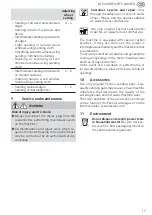
15
DTS 400 REQ, RTS 400 REQ
3
Intended use
The sanders are designed for sanding wood,
plastic, stone, composites, paint/varnish, filler
and similar materials as directed. Metals and
materials that contain asbestos must not be
processed.
To guarantee electrical safety, the machine must
not be damp or operated in a damp environment.
The machine must only be used for dry sanding.
The user is liable for improper or non-in-
tended use.
4
Technical data
Orbital sander
DTS 400 REQ
RTS 400 REQ
Power
250 W
250 W
No-load speed
6000 –
12000 rpm
6000 –
12000 rpm
Max. speed *
16000 rpm
16000 rpm
Sanding stroke
2.0 mm
2.0 mm
Sanding pad
100 x 150 mm 80 x 130 mm
Weight (without
mains cable,
with sanding
pad)
1.2 kg
1.2 kg
Safety class
/ II
/ II
* Max. speed in the event of faulty electronics
5
Machine features
[1-1]
On/Off switch
[1-2]
Plug it-connection
[1-3]
Speed control
[1-4]
Extractor connector
[1-5]
Sanding pad
[1-6]
Protector
[1-7]
Long-life dust bag
[1-8]
Dust bag adapter
[1-9]
Handle (insulated gripping surface)
The specified illustrations appear at the beginning
of the Operating instructions.
6
Commissioning
6.1
Initial operation
WARNING
Unauthorised voltage or frequency!
Risk of accident
X
The mains voltage and the frequency of the
power source must correspond with the
specifications on the machine’s name plate.
X
Observe country-specific regulations.
Connecting and detaching the mains power cable -
see Fig.
[2]
.
The switch
[1-1]
is an on/off switch (I = ON,
0 = OFF).
In case of a power failure or if the mains
connector is removed, move the on/off
switch immediately to the Off position.
This prevents uncontrolled restarting.
7
Settings
CAUTION
Risk of injury, electric shock
X
Always pull the mains plug out of the socket
before performing any type of work on the
machine!
7.1
Electronics
Smooth start-up
The electronically controlled smooth start-up
ensures that the machine starts up jolt-free.
Constant speed
The preselected motor speed is kept constant
through electronic control. This means that, if the
machine is used as intended (reasonable contact
pressure), a constant sanding speed is achieved.
Setting and adjusting the speed
The speed can be set
[1-3]
between 6000 and
12000 rpm using the adjusting wheel.
This enables you to optimise the sanding speed
to suit the material (see chapter 8).
7.2
Changing sanding pad [3]
An optimal work result can only be
achieved using original accessories and
consumables. The use of non-original
accessories or consumables invalidates
the right to claim under warranty.






































